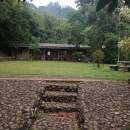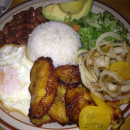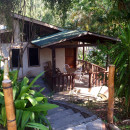Intense language learning + friendly staff - some homesickness= Conversa Past Review
By Alexa M (Journalism, Michigan State University) - abroad from 05/04/2013 to 05/31/2013 with
Centro Linguistico Conversa: Santa Ana - Direct Enrollment & Exchange
Conversa was a great way to learn spanish and immerse myself in the Tico culture, but if I had to do it again, I would rather go to a program outside of th San Jose area, possibly something more rural. Santa Anna was really just a Costa Rican suburb. This was nice but a little daunting at times. But Conversa itself really is a great hideaway from Santa Anna.
Review Photos




Personal Information
| How much international exposure did you have prior to this program? | 2 weeks - 1 month |
Review Your Program
|
* Overall educational experience
Academic rigor, intensity, resources, etc. |
Conversa is for the student that is interested in intense language learning. The classes are no more than 4 people, lots of individual help and absolutely no english! I struggled through high school spanish and knew that the only way I would learn was through total immersion. That is what converse provides. I went to Conversa for 1 month as part of a longer study abroad program at my school. |
|
* Host Country Program Administration
On-site administration of your program |
The teachers and administration at the school are extremely friendly and you can tell they love what they do and where they work. It's generally well run with many years of success in language learning. |
|
* Housing:
How satisfied were you with your living arrangements? |
I stayed with a host family. I was at my first home for about 1 week. The family I stayed with had a maid who was slowly stealing some of my things- socks, bathing suit, hair products etc. Not highly important things but things you use and notice if they are gone. When I finally realized I was not losing the things myself I expressed my confusion and frustration with the administration. They were quick and effective in moving me to another house. For the rest of my stay I loved with a professor from Conversa. It was an extremely good experience and I enjoyed getting to know her sisters and grandchildren that lived within the same building. While the first home stay was an uncomfortable experience, Conversa was swift and understanding and great with moving me to a better living situation. |
| * Food: |
There can be a wide variety of food in the San Jose area- Italian, Asian etc. Traditional Costa Rican dish called the casado consists of a lot of beans/rice, cooked vegetables, plantains, grilled meat with queso blanco and tortillas. Queso Blanco grows on you. I hated it for the first half of my trip, but then was in an area where they made it fresh and loved it. It's pretty much costa rican mozzarella and looks like tofu. Its very good grilled on a tortilla. After 2 months in Costa Rica I definitely had some stomach issues, which may have been a combination of many things. It's a lot of fiber all the time so get ready. |
|
* Social & Cultural Integration:
How integrated did you feel with the local culture? |
I felt that a home stay was the best was to really learn and understand the culture. You're eating their food and integrating yourself into their normal life. It's also a great way to continue your language learning. The only thing is that your schedule will definitely feel like high school- get up and be at school by 8, classes until you're starving for lunch. Then afternoon classes. You then either go home and do homework and or stay for activities they provide. I was surprised how normal the routine felt after a week. |
|
* Health Care:
How well were health issues addressed during the program? |
I never had any issues and I went to a pharmacy once or twice for general needs. |
| * Safety: |
Santa Ana is generally safe, just be smart. I and no one in my group never had any problems. But you definitely don't want to go into San Jose alone. If you stay in the right areas you won't have any problems but It's just good to have a buddy. We were told to only take cabs at night. |
| If you could do it all over again would you choose the same program? |
No
|
Finances
|
* Money: How easily were you able to live on a student's budget?
(1 = not very easy/$200+ on food & personal expenses/week, 2.5 = $100/week, 5 = very easily/minimal cost) |
I spent very little because of the nature of the program I was on. But I probably spent about $50 a week for food and other things. I didn't feel that much of a need to buy a lot of things. Costa Rica can be cheap if you make the effort. If you go on trips the hotel and tours/adventure activities will likely rack up some expenses. |
| Not including program expenses, about how much money did you spend on food and other expenses each week? | $50 |
| Do you have any general money-saving tips for future study abroad participants? | Costa Rica is cheap. Stay at hostels, don't go to major resorts. There's also not that much stuff I felt a need to buy- as far as souvenirs go. |
Language
| * Did your program have a foreign language component? | Yes |
|
How much did the program encourage you to use the language?
0 = No encouragement, 5 = frequent encouragement to use the language |
You only use spanish in class. They would like you to use it at lunch but sometimes it's nice to take a break and we used mostly english when we were all together. At home, your host family will use spanish with you because most of the time they don't know English. It can be stressful at times but you definitely learn the most that way. |
| How would you rate your language skills at the beginning of the program? | Beginner |
| How would you rate your language skills at the end of the program? | Intermediate |
| What was the highest level language course you had completed prior to departure? | Spanish 102 at MSU |
| How many hours per day did you use the language? | |
| Do you have any tips/advice on the best ways to practice the language for future study abroad participants? | It's best to go in with a basic understanding of Spanish. You won't be at a disadvantage if you don't know any but it definitely makes the transition a little easier. Language learning can be very stressful on the mind so get ready to feel exhausted. |
Direct Enrollment/Exchange
| * Did you study abroad through an exchange program or did you directly enroll in the foreign university? | Direct Enrollment |
Other Program Information
|
* Where did you live?
Select all that apply |
|
|
* Who did you live with?
Select all that apply |
|
|
* Who did you take classes with?
Select all that apply |
|
| About how many local friends did you make that you will likely keep in touch with? | 0 |
A Look Back
| * What did you like most about the program? |
|
| * What could be improved? |
|
| * What do you know now that you wish you knew before going on this program? | What I wish I would have known doesn't really have to do about Conversa, but about the experience of being abroad for an extended peril dog time. One thing, the food is going to be very overwhelming to eat after a while. I didn't necessarily get sick of it, but I think my stomach was just done with it after a while. Also, the real homesickness really sinks in after 2 weeks. I thought I had gotten past any feeling of missing home but then the honeymoon period ended. There's really no way to avoid you it. I also didn't realize how sick I would get of being in a group, so definitely if you go in a group, find time for yourself! I learned that there's no way for everything to be great and dandy all the time, but in the end, it's all a learning experience that you can look back on and appreciate. |
Reasons For Studying Abroad
| To help future students find programs attended by like-minded individuals, please choose the profile that most closely represents you. |
The Nearly Native or Trail BlazerCraving the most authentic experience possible, perhaps you lived with a host family or really got in good with the locals. You may have felt confined by your program requirements and group excursions. Instead, you'd have preferred to plan your own trips, even skipping class to conduct your own 'field work.' |








